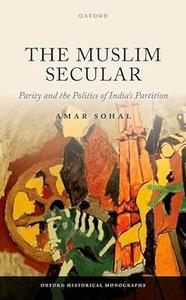

E-Books →The Muslim Secular Parity and the Politics of India's Partition
Published by: voska89 on 2-02-2024, 05:05 |  0
0

Free Download The Muslim Secular: Parity and the Politics of India's Partition
by Amar Sohal
English | 2023 | ISBN: 0198887639 | 343 Pages | True PDF | 1.87 MB
Concerned with the fate of the minority in the age of the nation-state, Muslim political thought in modern South Asia has often been associated with religious nationalism and the creation of Pakistan. The Muslim Secular complicates that story by reconstructing the ideas of three prominent thinker-actors of the Indian freedom struggle: the Indian National Congress leader Abul Kalam Azad, the popular Kashmiri politician Sheikh Abdullah, and the nonviolent Pashtun activist Abdul Ghaffar Khan. Revising the common view that they were mere acolytes of their celebrated Hindu colleagues M.K. Gandhi and Jawaharlal Nehru, this book argues that these three men collectively produced a distinct Muslim secularity from within the grander family of secular Indian nationalism; an intellectual tradition that has retained religion within the public space while nevertheless preventing it from defining either national membership or the state. At a time when many across the decolonising world believed that identity-based majorities and minorities were incompatible and had to be separated out into sovereign equals, Azad, Abdullah, and Ghaffar Khan thought differently about the problem of religious pluralism in a postcolonial democracy. The minority, they contended, could conceive of the majority not just as an antagonistic entity that is set against it, but to which it can belong and uniquely complete. Premising its claim to a single, united India upon the universalism of Islam, champions of the Muslim secular mobilised notions of federation and popular sovereignty to replace older monarchical and communitarian forms of power. But to finally jettison the demographic inequality between Hindus and Muslims, these thinkers redefined equality itself. Rejecting its liberal definition for being too abstract and thus prone to majoritarian assimilation, they replaced it with their own rendition of Indian parity to simultaneously evoke commonality and distinction between Hindu and Muslim peers. Azad, Abdullah, and Ghaffar Khan achieved this by deploying a range of concepts from profane inheritance and theological autonomy to linguistic diversity and ethical pledges. Retaining their Muslimness and Indian nationality in full, this crowning notion of equality-as-parity challenged both Gandhi and Nehru's abstractions and Mohammad Ali Jinnah's supposedly dangerous demand for Pakistan.
Buy Premium From My Links To Get Resumable Support,Max Speed & Support Me
Links are Interchangeable - Single Extraction
Related News
-
{related-news}

